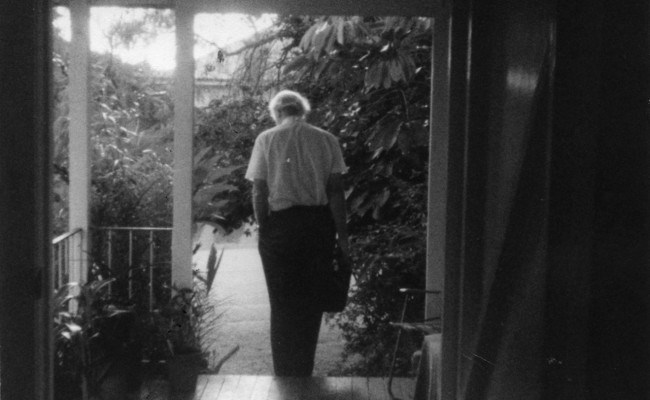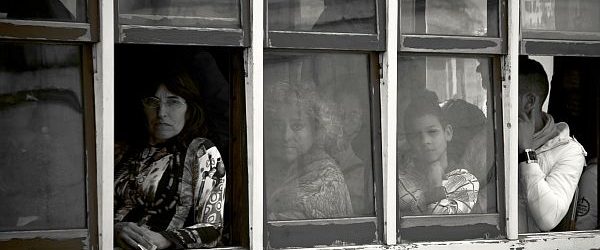Parts of a father
Figure 1: My father was a great bird watcher. Whenever we took off to the bush or to the rainforest on a family picnic, my father would hang his binoculars around his neck expectantly. He took delight in naming what he heard: his eyes would light up, his eyebrows would go up to crinkle his forehead, and he’d cock his head to one side to listen. He loved living in Australia; it was a revelation. ‘The bird life here is magnificent, isn’t it?’ he’d exclaim while looking up his copy of What Bird Is That? tucked into the glove box of the car. ‘You can see God’s hand at work.’ Then in an afterthought, he’d add, in an almost conciliatory tone, ‘I can see why Charles Darwin was astonished when he sailed this way. It confounded him like it confounds me.’ Not that he would have referred to Darwin and his evolutionary theories in so many words; I’ve made this bit up. My father spent the second half of his life trying to explain away Darwin’s theories of evolution, the fossil record, the accepted view of Australia’s prehistoric past, and our Indigenous and First Australians’ history of some 60 000 years. He hated the man.
So I would begin with birds if I were to write about my father. Strange, I’d forgotten about this particular love of his until this morning, until talk over breakfast with an American visitor and writer turned to magpies and their beautiful early morning call. I remember my father had fond stories of bird watching with his father in Cornwall. He would always tell the same story. How Bristol Grandpa knew all the scientific names of the birds of that region, how he could do the various calls too, mimicking what he heard, how he was a very clever man, everyone said.
My father looks like a bird, doesn’t he, with his neck outstretched, the fluff of his back-hair nestled behind his ears, his mouth open in a half voice, his nose like a beak, his eyes staring in concentration. And he is concentrating hard, you have to agree. He was on a mission to save souls; he firmly believed that he was ordained by God to do this. His real name is Tyndale John Rendle-Short although he was always referred to by his second Christian name of John, if he was referred to in this way at all. Here, for this classification, I am going to call him the Tufted Tyndale because of the way the hair on the left hugs his ear.
You can see darkness in the overhanging eyebrows, the lines under his eyes, the circles for nostrils, the creases down either side of his nose, and in the space of breath coming out of his mouth. What bible verses was he speaking when this photograph was taken? Was he reading from chapter one of Genesis? Extemporising? Was he about to pray for the sins of the world, troubled by the sins of his daughters?
This is my father; this is not my father.
‘This view of negation,’ writes Sigmund Freud, ‘fits very well with the fact that in analysis we never discover a “no” in the unconscious.’ Not that my father would have liked this sort of reference. He believed Freud to be an anti-Christ along with Darwin, a wicked man whose writings and influence administered untold damage. But the truth is, what isn’t here, what I can’t see – the shape and colour and dimension of the darkness – helps me write my father, this Tufted Tyndale, into some sort of existence. I can stare at this photograph and try to imagine me by his side, holding his hand, even singing a hymn together.
Figure 2: Here he is as another sort of bird, I fancy, hair fluffed out both sides of his ears, his head inched sidewards to glance at the crucifix orchids coming along in the rockery, briefcase in one hand – I never did know what he took to and from work in that bag of his – and the sound of jangling from the loose change he’s fiddling with in his pocket with his other hand. I still can hear the rattle of one and two and five cent coins all these years later.
‘Dad off to work at the hospital’ is a photo from a small collection I took with my instamatic when I was a teenager. I’ve caught him disappearing down off the front porch of our house one Saturday morning.
I’ll call this father the Furtive Tyndale.
(Or perhaps it should be the Far-Too-Busy-And-Important Tyndale.)
For as I gaze at this species, whatever its name, and as I write these words across the page, I sense longing, unhidden desire to revisit those years, wanting to ‘do over’ my relationship with my father (as my American writing friend would put it) – wanting to discover that I did have some connection.
I wish sometimes I came from a more normal family, whatever normal is, so I could share with my parents the ordinary things of life – the feeling of settling into a new city, the pleasure of going to work in trams, the delight of eating spaghetti at the bar in Pellegrini’s.
A man from my father’s church once told me that it was through talking about orchids that he could find something to say to John, as he called him, when they found themselves sipping cups of tea together at the end of the service. It was this man’s way of growing a connection with my father, especially at this difficult time when he was deteriorating mentally because of the onset of Alzheimer’s. ‘Orchids makes John perk up,’ he told me, ‘and in any case, there’s quite a lot to say about them too.’
In one of the last interviews the Australian poet Dorothy Porter gave, in the year before she died, she talked about the task of the writer as she sees it: ‘I don’t want to judge, I want to understand.’ As I write across the page about the Furtive Tyndale I sense I am writing pencil notes across his body, trying to understand, annotating afresh what I thought I once knew. This sensation is so real I can feel my forefinger running across the back of his elbows outlining the wrinkles where it’s grey-hard and a little bit calloused, or the softer skin of his forearm the surface of which is like the best of Japanese paper, or tickling the hair on his arm to make us both look up and giggle, to trace the shape and form of letters and sentences trying to make sense of the classification. This is more than holding a hand, which I loved to do in those later years. This is a sensation of feeling pressure exerted. Almost, and I can barely admit to this part, to the point of hurting him, to squeezing his body to the point where he does take notice, where he has to look at me, admit to me being there.
Figure 3: My father sits at the kitchen table reading Time magazine.
I’ll call my reading father the Pensive Tyndale.
My father believed the body was the temple of the living god. He was a physician; he looked after children’s bodies in the hospital by day. But what he was really interested in, by night and on Sundays when preaching from the pulpit, was preventing adult bodies from going to hell.
Key to fathers
Truth be told, this is not how I remember him, not as the Pensive Tyndale, nor at the kitchen table reading. When I think of my father, I think of him writing – writing, writing, writing. Like here.
Figure 4: My father as writer, the Typewriter Tyndale (another TT).
My father never showed us his work in progress. Occasionally he gave me one of his books and he did like to send his newly published Christian books to my then-husband, in recognition of N’s work in science and because my father believed N was the head of his daughter’s family. Typewriter Tyndale believed that women should be silent, that they should be seen and not heard, that women should be subservient to men, and that men are the head of the household.
TT2 and I could never talk about our mutual love of writing. He would never understand what it was I was doing here, for instance, with this field guide. He would be curious, I feel sure, but he wouldn’t talk about it, he wouldn’t want to understand. ‘Now why would you want to write about writing about me,’ he’d query, ‘and why these funny names? Mind you, your grandfather was a great taxonomist.’ TT2 typed up all his books with two fingers – he published eighteen altogether, some medical, others Christian apologetics. He would always be found in his study behind the curtain with the door shut, sitting in his armchair, a throw rug pulled up over his knees, typewriter on his lap.
Field information
Note 1. I caught the Birthday Tyndale in triptych here in the nursing home on the occasion of his 90th birthday. We brought him sticky chocolate with sugared red roses. His eyes lit up on seeing it. He sucked his lips. He took delight in cutting the cake into pieces the way he used to carve the roasts for Sunday lunch. Birthday Tyndale choreographed a dance that day with his close-to-a-century-year-old hands as I sat mesmerised by the performance.
Figure 5, 6, 7: My father has such gorgeous hands. I love watching them, the way his fingers move, long, tapered. His nails always perfectly cut, a pinkly colour, with marked ridges over the nail plate running parallel from the cuticle. They look as though they should be able to play a piano, except that he always said he didn’t have a musical bone in him. As a little girl, I used to think he played with his hands because he was bored, marking time, impatient even; waiting for the next big thing. ‘Now then,’ he’d say to no one in particular, ‘what’s the score?’
In his old age, with the softness of mind because of Alzheimer’s, his hands dance largo, float and rise and fall in a slow movement set to its own tune, an adagio. First, he clasps them in front of his chest as though in a praying gesture, a supplicant hold where the palms lie flat against one another. Then he pauses a moment to pray, to ask for God’s blessing before the fingers start to stir larghetto. They loop first this way so the fingers interlace each other; then right then left then right then left, before rising up elongated in a slow, seesaw action. A ritual dance.
I love the way I see him thinking with his hands, his fingers resting in gestural moments to plumb what is known, to hesitate over what is not known. His half-thoughts dance around the small room he now inhabits in the nursing home and sometimes it makes me forget what a waiting room it is, how his life is very nearly spent. Sometimes too, he is very funny, quite droll, and I laugh so much I get stitches. The Birthday Tyndale says: ‘I don’t deserve all this. You are all so good to me. Blessings on you.’
Note 2. Figure 8, 9, 10: The Tragen Tyndale (tragen, German, to draw, to draft).
When my father died, a writer friend wrote: ‘What a momentous event in all your lives, the farewelling from life and earth of paterfamilias. I do not know if there is ever enough morphine, quite.’
In those last days before he ‘passed into the presence of the Lord’, I drew my father in the way I write words: one letter at a time, one mark here, one drag there. My Tragen Tyndale. Or perhaps, more correctly, my Larghetto Tyndale.
In the nursing home, I bend close to kiss the Larghetto Tyndale on his head, and I smell him and he smells just the way a father’s body should smell. Musty, like wool that’s been left in the rain, or shaved damp wood, or unwashed skin that hasn’t seen the light for days. It is this smell that draws me close, that allows me to lean towards him, not just then, but in the writing of this guide. It allows me to imagine the wound on my Larghetto’s balding head, that festering lesion from a cancerous lump the doctors said they could do nothing about, not now. I fancy his wound is in the shape of an orchid, one of the ones he loved, the petals and stems and floating roots curiously shaped and speckled like one of his favourites, the cymbidium; the colour of his abrasion where the blood has broken the surface of skin under the bandage like that of a purple Cooktown orchid of the kind he would have brought into the living room for us all to admire.
I draw fast, I don’t have long – 2.50, 2.55, five minutes past 3 o’clock – the Larghetto Tyndale will be quite gone the next day. I watch him breathe his final breaths as I draw as I write and figure all I want to remember from these last days is singing hymns with him with our two faltering voices from his favourite Presbyterian hymnal: Love divine, all loves excelling; Nearer my God, nearer to thee. Yet what I recall in forte is not the chortle and cadence of beautiful bird-like songs of this one and that calling to each other masterfully, but the ache in my trachea as lumps of I know not what press hard against the cartilage in my throat – I can barely speak, I can’t sing – trachea from Greek trakheia (artēria), from trakhus meaning rough.



